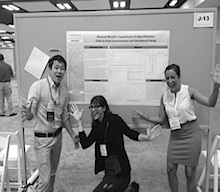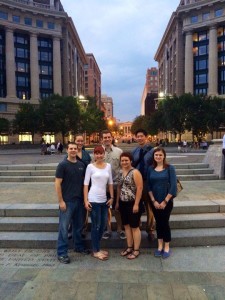 What is a mentor?
What is a mentor?
I’ve had several mentors in my grad school career, but I don’t always realize it. The number is often higher than what I typically think, because, like many of us, I tend to think of mentorship as a formal relationship with someone who is more senior in terms of age or authority. The first that comes to mind is an academic advisor, a dissertation chair, or a clinical supervisor. It’s important to remember that some mentoring relationships are between folks who are fairly equal in age, position, or other status; the mentorship can also be rather informal (e.g., meeting a colleague or peer for coffee). As APA’s guide for mentors and mentees sums it up, a mentee is simply someone who learns from another.
Why should I look for a mentor?
I turn to different mentors for different things: how to manage work-life balance, thinking about academia and family, how to respond to a particularly snarky reviewer letter, how to return low grades and difficult feedback to my students. Some mentors give me concrete advice and assist me in developing skills, others model how to cope with stress and validate my work boundaries of saying “no” to extra tasks. Speaking as a woman, finding lady-mentors in the field has been extremely helpful: most of us tend to feel more motivated and identify more with mentors who share similar qualities and identities as us. More than this, the research shows that mentoring works. Those with mentors tend to do better and feel better on the job compared to people without mentors (Clark, Harden, & Johnson, 2000; Elman, Illfelder-Kaye, & Robiner, 2005).
This raises the (valid) issue: what if you don’t have a reliable mentor in a particular space or job? Navigating jobs and academics as a graduate student is made more difficult without guides. That is why being intentional about networking with potential mentors at APA can be so important.
Being Intentional: Looking for Mentors @ APA
If you are like me, you are rather introverted. The term ‘networking’ makes you want to crawl into your snuggie and watch five episodes in a row on Netflix (see my post in the coming weeks on networking!). Mentally prepare yourself:
• Reflect. What support do you most need at this stage in your training? What type of mentor (formal, informal; clinical, academic) would be most beneficial, and what do you need from them?
• Don’t forget to think horizontally! Remember that mentors can be other students. Making connections for academic, social, or emotional support and feedback with a student outside of your home program can lend you new perspectives on things.
• Set a plan. Look through the Convention programming to see where you could best network to begin a mentoring relationship. This includes APAGS programming (check out the Food for Thought programs!).
• Remember your manners. A lot of people like to mentor in a variety of ways, but the bottom line is they are still providing you with their time. It’s up to you to initiate contact and to be up front about your goals. APA has made a handy chart (which also shows the do’s and dont’s for mentors, if you want to see how the other half should operate!) for you to consult.
• Don’t take it personally. Some people are just so awesome we all want them to be our mentors (I’m looking at you, Dr. Brené Brown). To be that awesome takes a lot of time, and so sometimes a potential mentor may say they cannot develop a mentoring relationship with you.
Resources:
This post mostly focused on a brief overview of what and how to look for in a mentor at APA. Here are some great, graduate student-oriented resources on mentoring relationships:
• Getting Mentored in Graduate School, by W. Brad Johnson and Jennifer M. Huwe. This is a book written by a mentor-mentee duo and they use their own experiences to write the chapters.
• Sticky Situations in Mentoring, a blog post by gradPSYCH staff Jamie Chamberlin. The post takes readers through how to identify problems in a mentoring relationship and how to switch mentors if necessary.
• Building Mentorships for Success, a blog post by Melissa Dittman, gradPSYCH staff.
I hope to see you in August in networking mode!
References:
- American Psychological Association Presidential Task Force on Mentoring (2006). Introduction to mentoring: A guide for mentors and mentees. http://www.apa.org/education/grad/mentoring.aspx
- Clark, R.A., Harden, S.L., & Johnson, W.B. (2000). Mentoring relationships in clinical psychology doctoral training: Results of a national survey. Teaching of Psychology, 27, 262-268.
- Elman, N.S., Illfelder-Kaye, J., & Robiner, W.N. (2005). Professional development: Training for professionalism as a foundation for competent practice in psychology. Professional Psychology: Research and Practice, 36, 367-375.
Editor’s Note: Stephanie Winkeljohn Black is a student at the University of Louisville and a member of the APAGS Convention Committee.





 5) Oh Canada!
5) Oh Canada!
 avel to Canada, the first thing you need is a passport. If you do not already have one, or need a replacement or renewal, you should definitely consider applying soon. Processing times take anywhere between 8 business days to 6 weeks depending on how urgent you need it. Get started today by visiting the
avel to Canada, the first thing you need is a passport. If you do not already have one, or need a replacement or renewal, you should definitely consider applying soon. Processing times take anywhere between 8 business days to 6 weeks depending on how urgent you need it. Get started today by visiting the 


